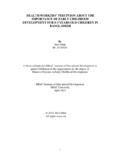Health worker’s perception about the importance of early childhood development for 0-3 years old children in Bangladesh
Abstract
The qualitative study focuses on the health workers’ perception about importance of Early Childhood Development (ECD). The objectives of this study are to find the knowledge gap of the health workers and the scope of involvements to promote ECD. The respondents are community health workers (N=12) from different rural areas of Dhaka and Chattogram District. Research tools used are IDI and FGD guidelines and conducted in Bengali medium. All of the health workers have some idea about ECD. Basically, most of the respondents believe, ECD starts just after birth and related to physical and mental growth only. They described, early childhood development of a child means to walk, run, crawl and speak on time. They also stated some factors like family issues, neighbors, food habit, atmosphere, culture, behavior, play mate as well as educational and financial status of parents those may hamper on early childhood development. Most of the health workers believe, adults can support ECD by giving quality time, taking care, ensuring food and nutrition, praising, go for visit, storytelling, gossiping as well as creating friendly behavior with their children. According to their job descriptions and services there is no direct practice of ECD related activities currently in maternal and child health issues (ANC, PNC, EPI and other vaccination program). The study shows, health workers require gaining knowledge through various long and short courses on ECD and applying them by involving into Uthan Boithak, Coordination meeting and ECD corner.

